最新仁爱英语-八年级上册第3单元课文翻译、语法总结
仁爱英语八年级上册Unit3-topic2知识点总结

Unit3 Our HobbiesTopic2 What sweet music!一、重点短语continue doing sth. 继续做某事 be born 出生set up 建立classical music 古典音乐folk songs 民歌stage name 艺名everyday life 日常生活be famous for 因……而著名look for 寻找二、重点句型1. And it sounds great! 听起来好极了。
2. What kind of musical instrument can you play? 你会弹什么种类的乐器?3. We have guitar, violin, piano and drum lessons for just ¥240 each. 我们有吉他课、小提琴课、钢琴课、和打鼓课,每个课程仅需要240元。
4. What do you do in your free time? 你在闲暇之际干些什么?5. Classical music is serious music. 古典音乐是一种很严肃的音乐。
6. Pop music often comes and goes easily. 流行音乐来得快去得也快。
7. They are very popular among young people. 它们在年轻人当中很流行。
8. Guo Lanying, Song Zuying and Tenger are famous for their folk songs. 郭兰英,宋祖英和腾格尔以(唱)民歌而出名。
9. It is one of the most famous rock bands in the world. 它是世界上最著名的摇滚乐队之一。
10. In the fall of 1976, a 14-year-old high school student, Larry Mullen, looked for some musicians. 在1976年的秋天,一个14岁的中学生,Larry Mullen寻找一些音乐家。
最新仁爱版英语八年级上册Unit3 Topic1知识点 完整版
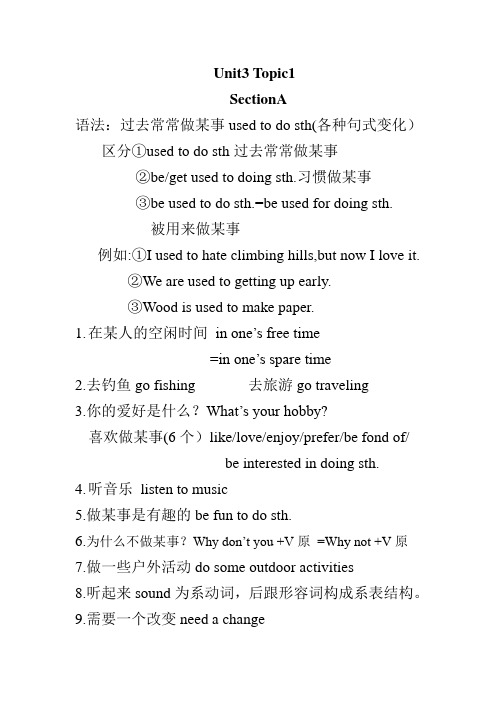
Unit3 Topic1SectionA语法:过去常常做某事used to do sth(各种句式变化)区分①used to do sth过去常常做某事②be/get used to doing sth.习惯做某事③be used to do sth.=be used for doing sth.被用来做某事例如:①I used to hate climbing hills,but now I love it.②We are used to getting up early.③Wood is used to make paper.1.在某人的空闲时间in one’s free time=in one’s spare time2.去钓鱼go fishing 去旅游go traveling3.你的爱好是什么?What’s your hobby?喜欢做某事(6个)like/love/enjoy/prefer/be fond of/be interested in doing sth.4.听音乐listen to music5.做某事是有趣的be fun to do sth.6.为什么不做某事?Why don’t you +V原=Why not +V原7.做一些户外活动do some outdoor activities8.听起来sound为系动词,后跟形容词构成系表结构。
9.需要一个改变need a change10.随着音乐跳舞dance to music11.遛狗walk a pet dog12.集邮collect stamps13.种花plant flowers 浇花water flowers14.爬山climb mountainsUnit3 Topic1 SectionB1.集邮collect stamps 邮票集stamp collection2.想要做某事would like to do sth.=want to do sth.=feel like doing sth.3.感叹句what+名词①What beautiful stamps!②What fine weather!③What a nice girl!4.许多a lot of=lots of后跟可数名词复数或不可数名词5.三种推测①肯定推测must be(必定是)②可能性推测may be(可能是)③否定推测can't be(不可能是)6.向…学习learn…from学习做某事learn to do sth.7.你过去常常有什么爱好?What hobbies did you use to have?I used to collect baseball cards.过去常常做某事used to do sth.I used to go fishing.(否定句)I didn’t use to go fishing.(一般疑问句)Did you use to go fishing?Yes,I did/No,I didn,t.8.康康来了。
Unit3-仁爱八上知识点总结

Unit 3 Our HobbiesTopic 1 What’s your hobby?一、重点词汇hobby 爱好friendship友谊knowledge 知识maybe 可能,也许plant 植物;种植comfort 安慰stick 粘贴,粘住self-introduction 自我介绍everyday life 日常生活whether···or not / if 是否such as 例如Take/have a bath/shower 洗澡go dancing 跳舞go boating/rowing 划船play volleyball 打排球drawing/painting 画画collecting stamps 集邮collecting coins 收藏硬币collection listening to pop music/classical music 听流行音乐/古典音乐be interested in (doing) = show interest in 对······感兴趣love/like doing sth. 喜欢做某事enjoy doing sth. 喜欢做某事prefer doing sth. 喜欢做某事be fond of doing sth. 喜欢做某事hate doing sth. 讨厌做某事have fun doing sth.= It’s fun to do sth. 做某事很开心Sounds good!听起来很好。
What beautiful stamps! 多么美丽的邮票啊!It is easy to get started.很容易着手/ 开始。
get started 开始collect few things 几乎不收集东西provide sb. with sth. = provide sth for sb. 为某人提供某物walk a pet dog 遛狗in one’s free/spare time 在空余时间take care of 照顾= look after二、句型、语法1.I used to listen to rock music but now I collect telephone cards and paintings. 我过去常听摇滚乐,可现在我集电话卡和画。
最新仁爱版英语八年级上册Unit3 Topic3知识点 完整版

Unit3 Topic3 SectionA语法:过去进行时(表示过去的某个时刻或过去某一时间段内正在进行的动作)结构为was/were+动词的现在分词特殊疑问句:What were you doing at this time yesterday?肯定句:I was taking a shower.否定句:I wasn’t taking a shower.一般疑问句:Were you taking a shower?肯定/否定回答:Yes,I was./No,I wasn’t.1.打电话的常用语:我是Jim.(This is Jim speaking.)我能和Jane通话吗?May I speak to Jane?2.请别挂电话。
Hold the line,please.=Hold on,please.=Wait a moment,please.3.接电话answer the phone 但是没人接but no one answered (有人敲门)去开门answer the door4.打电话让某人做某事call sb.to do sth.5.洗衣服wash some clothes 大扫除do some cleaning6.消磨时间pass the time=kill the time7.直到···until (引导时间状语从句)8.和朋友聊天chat with friends chat--chatting--chatted9.听新闻listen to the news 消息,新闻news为不可数名词没有消息就是好消息。
No news is good news.10.植树plant trees 参观博物馆visit a museum11.吃北京烤鸭eat Beijing roast duck12.打包do some packingUnit3 Topic3 SectionB1.看电影watch a movie/see a movie2.我赞同。
仁爱英语八年级上册unit 3知识点归纳
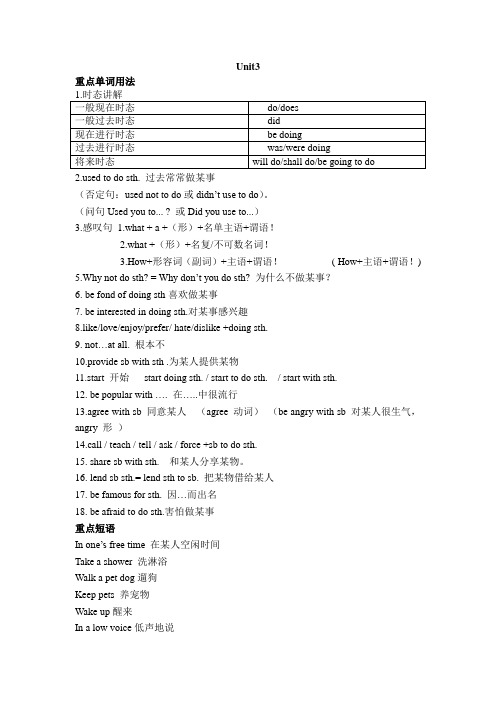
Unit3重点单词用法ed to do sth. 过去常常做某事(否定句:used not to do或didn’t use to do)。
(问句Used you to... ? 或Did you use to...)3.感叹句1.what + a +(形)+名单主语+谓语!2.what +(形)+名复/不可数名词!3.How+形容词(副词)+主语+谓语!( How+主语+谓语!)5.Why not do sth? = Why don’t you do sth? 为什么不做某事?6. be fond of doing sth喜欢做某事7. be interested in doing sth.对某事感兴趣8.like/love/enjoy/prefer/ hate/dislike +doing sth.9. not…at all.根本不10.provide sb with sth .为某人提供某物11.start 开始start doing sth. / start to do sth. / start with sth.12. be popular with …. 在…..中很流行13.agree with sb 同意某人(agree 动词)(be angry with sb 对某人很生气,angry 形)14.call / teach / tell / ask / force +sb to do sth.15. share sb with sth. 和某人分享某物。
16. lend sb sth.= lend sth to sb. 把某物借给某人17. be famous for sth. 因…而出名18. be afraid to do sth.害怕做某事重点短语In one’s free time 在某人空闲时间Take a shower 洗淋浴Walk a pet dog遛狗Keep pets 养宠物Wake up醒来In a low voice低声地说。
仁爱英语八年级上册Unit3知识点总结
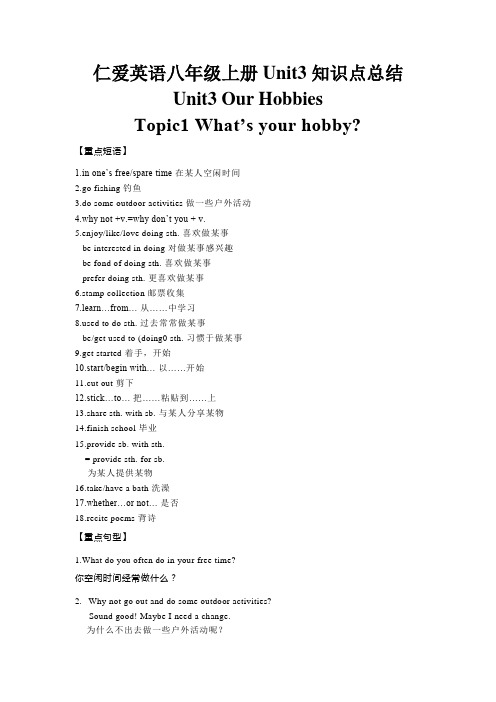
仁爱英语八年级上册Unit3知识点总结Unit3 Our HobbiesTopic1 What’s your hobby?【重点短语】1.in one’s free/spare time在某人空闲时间2.go fishing 钓鱼3.do some outdoor activities 做一些户外活动4.why not +v.=why don’t you + v.5.enjoy/like/love doing sth. 喜欢做某事be interested in doing 对做某事感兴趣be fond of doing sth. 喜欢做某事prefer doing sth. 更喜欢做某事6.stamp collection 邮票收集7.learn…from…从……中学习ed to do sth. 过去常常做某事be/get used to (doing0 sth. 习惯于做某事9.get started 着手,开始10.start/begin with…以……开始11.cut out 剪下12.stick…to…把……粘贴到……上13.share sth. with sb. 与某人分享某物14.finish school 毕业15.provide sb. with sth.= provide sth. for sb.为某人提供某物16.take/have a bath 洗澡17.whether…or not…是否18.recite poems 背诗【重点句型】1.What do you often do in your free time?你空闲时间经常做什么?2.--Why not go out and do some outdoor activities?--Sound good! Maybe I need a change.--为什么不出去做一些户外活动呢?--听起来不错,也许我需要改变。
仁爱八上英语unit3topic3

八年级英语(仁爱版)上册Unit3Topic3 语言点归纳八年级英语(仁爱版)上册Unit3 语言点归纳Topic3 The movie is so wonderful!一. 重点词汇nobody无人 museum 博物馆church教堂factory工厂program节目pleasant令人愉快的 handsome英俊的agree with sb. 与某人看法一致take a shower洗澡answer the phone 接电话do some cleaning 打扫卫生knock at 敲too…to太…..以至于不能talk about谈论关于二.重点句型1.I called you but nobody answered the phone. (Page 69)我给你打电话了,但是没有人接。
answer the phone 固定词组,可翻译为“接电话”answer的意思是“回答,答复”。
如:1) What shall I answer?我将怎样回答呢?2) Have you answered his letter? 你回了他的信吗?3) Answer the door, please, Jack. Someone is knocking at the door.开门去,杰克,有人在敲门。
2.Oh, I was taking a shower. (Page 69) 我在淋浴。
take a shower淋浴,也可以用动词have代替take。
如:洗澡 take a bath have a bath休息一下take a resthave a rest看一看take a lookhave a look散散步take a walkhave a walk3.Yeah, I think so. (Page 71)是,我也这样认为。
在think后面可以用so来代替前面的内容,以避免重复。
例如:— Is he at home? 他在家吗?— Yes, I think so. 是的,我想他在家。
仁爱英语八年级上册Unit3-topic3知识点总结
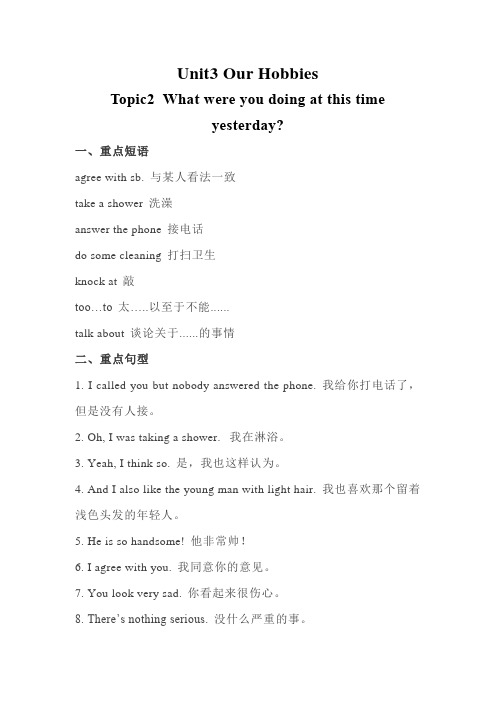
Unit3 Our HobbiesTopic2What were you doing at this timeyesterday?一、重点短语agree with sb. 与某人看法一致take a shower 洗澡answer the phone 接电话do some cleaning 打扫卫生knock at 敲too…to 太…..以至于不能......talk about 谈论关于......的事情二、重点句型1. I called you but nobody answered the phone. 我给你打电话了,但是没有人接。
2. Oh, I was taking a shower. 我在淋浴。
3. Yeah, I think so. 是,我也这样认为。
4. And I also like the young man with light hair. 我也喜欢那个留着浅色头发的年轻人。
5. He is so handsome! 他非常帅!6. I agree with you. 我同意你的意见。
7. You look very sad. 你看起来很伤心。
8. There’s nothing serious. 没什么严重的事。
9. Well, Miss Wang was angry with me. 王老师生我的气了。
10. In the early 1800s, Sunday was the “holy day". 在19世纪早期,星期日的含义就是“神圣的一天”。
11. I n the US, workers called them“blue Mondays".在美国,工人们把它们叫做“蓝色星期一”。
12. Then decide how you are going to spend your weekend. 然后决定你的周末怎么过。
13. Did you have a good time? 你们玩得高兴吗?Section A1. Hold the line, please.Hold the line = hold on = wait a moment =just a moment 为打电话用语,意为“等一会”2. nobody = not…anybody;如:Thereis nobody in the room. = There is not anybody in the room.no = not…any如:I have no friends. = I don’t have any friends.3. take a shower = have a shower洗淋浴take a bath= have a bath 洗澡Section B1. watcha movie/ film = see a movie/ film 看电影;go to the cinema/ movie theater 去电影院2. agree 的用法:(1) agree with 后常接人或what引导的从句,表同意某人,如:①I agree with you.②Iagree with what you said.(2) agree to sth.,表“同意某事”,接表示建议、计划、条件、安排等的词。
(完整版)仁爱英语八年级上册Unit1、2、3、4课文翻译
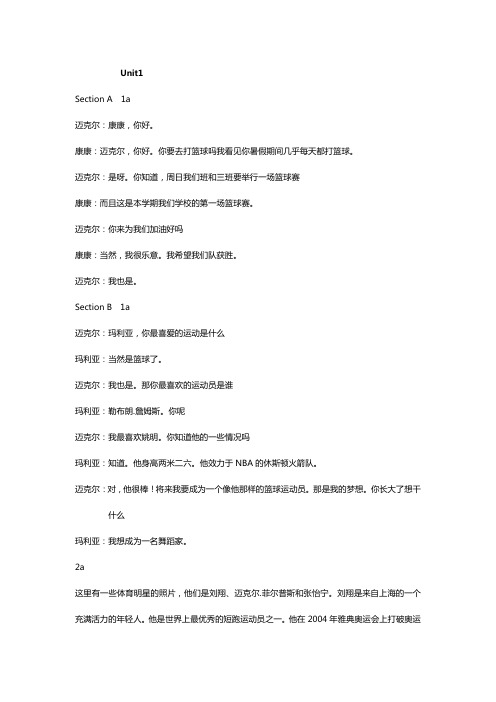
Unit1Section A 1a迈克尔:康康,你好。
康康:迈克尔,你好。
你要去打篮球吗我看见你暑假期间几乎每天都打篮球。
迈克尔:是呀。
你知道,周日我们班和三班要举行一场篮球赛康康:而且这是本学期我们学校的第一场篮球赛。
迈克尔:你来为我们加油好吗康康:当然,我很乐意。
我希望我们队获胜。
迈克尔:我也是。
Section B 1a迈克尔:玛利亚,你最喜爱的运动是什么玛利亚:当然是篮球了。
迈克尔:我也是。
那你最喜欢的运动员是谁玛利亚:勒布朗.詹姆斯。
你呢迈克尔:我最喜欢姚明。
你知道他的一些情况吗玛利亚:知道。
他身高两米二六。
他效力于NBA的休斯顿火箭队。
迈克尔:对,他很棒!将来我要成为一个像他那样的篮球运动员。
那是我的梦想。
你长大了想干什么玛利亚:我想成为一名舞蹈家。
2a这里有一些体育明星的照片,他们是刘翔、迈克尔.菲尔普斯和张怡宁。
刘翔是来自上海的一个充满活力的年轻人。
他是世界上最优秀的短跑运动员之一。
他在2004年雅典奥运会上打破奥运会纪录,并赢得了一枚金牌,但是在2008年北京奥运会上,由于脚伤他不得不放弃了比赛。
多么遗憾!菲尔普斯来自美国,他在北京奥运会的游泳比赛中赢得了八枚金牌。
他是第一个在一届奥运会上赢得如此多金牌的运动员。
作为世界上最优秀的女乒乓求运动员之一的张怡宁在雅典奥运会和北京奥运会上分别赢得两枚金牌。
Section C1a安非常喜欢运动。
她每周骑两次自行车,还经常星期天去爬上。
她每天在体育馆花半个小时来锻炼。
她星期六学打棒球,现在她棒球打得相当好。
她还擅长跳跃。
下周末将举行校运动会。
她打算参加跳高和跳远比赛。
她的同学们将会为她加油。
他们确信她会赢。
Section D1a昨天,着名足球明星大卫.贝克汉姆和他的队友抵达北京。
明天他的球队将和中国国家队进行一场比赛。
球迷们非常兴奋。
遗憾的是他们不会停留很长时间。
后天他们将动身去日本。
TOPIC 2 Would you mind teaching me?Section A1a康康:迈克尔,请你帮个忙好吗迈克尔:当然。
新版仁爱英语八年级上册Unit3Topic3
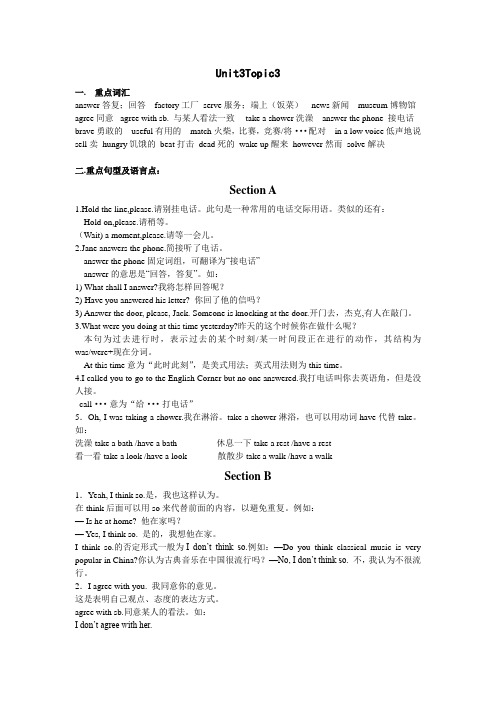
Unit3Topic3一. 重点词汇answer答复;回答factory工厂 serve服务;端上(饭菜)news新闻museum博物馆agree同意 agree with sb. 与某人看法一致take a shower洗澡 answer the phone 接电话brave勇敢的useful有用的match火柴,比赛,竞赛/将···配对in a low voice低声地说sell卖hungry饥饿的beat打击dead死的wake up醒来however然而solve解决二.重点句型及语言点:Section A1.Hold the line,please.请别挂电话。
此句是一种常用的电话交际用语。
类似的还有:Hold on,please.请稍等。
(Wait) a moment,please.请等一会儿。
2.Jane answers the phone.简接听了电话。
answer the phone 固定词组,可翻译为“接电话”answer的意思是“回答,答复”。
如:1) What shall I answer?我将怎样回答呢?2) Have you answered his letter? 你回了他的信吗?3) Answer the door, please, Jack. Someone is knocking at the door.开门去,杰克,有人在敲门。
3.What were you doing at this time yesterday?昨天的这个时候你在做什么呢?本句为过去进行时,表示过去的某个时刻/某一时间段正在进行的动作,其结构为was/were+现在分词。
At this time意为“此时此刻”,是美式用法;英式用法则为this time。
4.I called you to go to the English Corner but no one answered.我打电话叫你去英语角,但是没人接。
北京仁爱版初中英语八年级上册 Unit 3 Topic 2 课文翻译

北京仁爱版初中英语八年级上册Unit3 Topic2 课文翻译S ectionA-1aJack:What are you going to do this Sunday evening?你这周日晚上打算干什么?Sally:I'm going to a concert.我要去一个音乐会。
Jack:How exciting! Who is going to sing at the concert?太兴奋啦!谁会在音乐会上唱歌呢?Sally:Celine Dion. Do you know the song My Heart Will Go On?席琳·迪翁。
你知道《我心永恒》这首歌吗?Jack:Yes. Is that her song?知道。
那是她唱的吗?Sally:Right. And it sounds beautiful!是的。
太好听了!Jack:Where is she going to give the concert?她要在哪里开音乐会呢?Sally:At the Music Hall.在音乐厅。
Jack:Oh, wonderful! What time is it going to start?哦,太好了!几点开始?Sally:At 7:30 p.m. What not come with me?下午七点半。
跟我一起去怎么样?Jack:I'd like to, but I am going to watch movies with Steve.我很想去,可是我得和史蒂夫一起去看电影。
Sally:What a pity! Hmm... I can lend you some CDs of her songs. I think you will enjoy the m.太遗憾了!嗯...我可以借给你一些她的歌碟。
我觉得你会喜欢的。
Jack:Thanks a lot.非常感谢。
仁爱英语-八年级上册第3单元课文翻译、语法总结

UNIT 3 our habbiesTopic1Section A1、 What do you do in your free time ?在空闲时间里你做什么?2、 go fishing 去钓鱼3、 enjoy reading stories and listening to music 喜欢读故事书听音乐4、 What’s your habby?你的爱好是什么?5、 a movie fan 电影迷6、 go to the movie theater 去看电影7、 Why not go out and do some outdoor activities?为什么不出去做户外活动?8、 do some outdoor activities 做户外活动9、 sounds good 听起来很好10、 be interested in 对。
感兴趣11、 play the guitar 弹吉他12、 be fond of 喜欢13、 play soccer 踢足球14、 walk a pet dog 遛狗15、 collect stamps 集邮16、 plant flowers 种花17、 climb mountains 爬山18、 fly kites 放风筝19、 go travelling 去旅行20、 go swimming 去游泳Section B21、 It must be a great fun 那一定很有趣22、 used to do sth.否定式:didn’t use to do sth 过去常常做某事(但现在不做了)23、 Kangkang is fond of swimming 康康喜欢游泳24、 What hobbies did you use to have ?你过去有什么爱好?25、 What are you looking at ?你在看什么呢?26、 I am going swimming 我要去游泳27、 learn...from 向。
北京仁爱版初中英语八年级上册 unit 3 topic 2 课文翻译

Jack: What are you going to do this Sunday evening? 你这周日晚上打算干什么?Sally:I'm going to a concert . 我要去一个音乐会。
Jack: How exciting! Who is going to sing at the concert? 太兴奋啦!谁会在音乐会上唱歌呢?Sally:Celine Dion . Do you know the song My Heart Will Go On? 席琳·迪翁。
你知道《我心永恒》这首歌吗?Jack: Yes . Is that her song? 知道。
那是她唱的吗?Sally:Right . And it sounds beautiful! 是的。
太好听了!Jack: Where is she going to give the concert? 她要在哪里开音乐会呢?Sally:At the Music Hall . 在音乐厅。
Jack: Oh, wonderful! What time is it going to start? 哦,太好了!几点开始?Sally:At 7:30 p .m . What not come with me? 下午七点半。
跟我一起去怎么样?Jack: I'd like to, but I am going to watch movies with Steve . 我很想去,可是我得和史蒂夫一起去看电影。
Sally:What a pity!Hmm . . . I can lend you some CDs of her songs .I think you will enjoy them .太遗憾了!嗯 ...我可以借给你一些她的歌碟。
我觉得你会喜欢的。
Jack: Thanks a lot . 非常感谢。
Sally:You're welcome . 不客气。
仁爱英语八年级上册课文翻译

仁爱英语八年级上册课文翻译八年级英语翻译涉及丰富的语言学知识,想要确保英语翻译水平不断提高,就要根据语言功能、环境和场合的不同进行恰当的语言学模式的选用。
下面给大家分享一些仁爱英语八年级上册课文翻译,大家快来跟一起欣赏吧。
仁爱英语八年级上册课文翻译(一) Unit 3 topic3 section C 卖火柴的小女孩!这是一个又冷有黑的除夕夜,天下着雪。
许多人都聚在暖和的屋子里。
一个可怜的小女孩光着脚走在大街上,她手里拿着一些火柴。
卖火柴,卖火柴! 小女孩低声喊着。
路过的人们没人听到她的声音,她一根火柴也没卖出去,也没人给她一个硬币。
风呼呼地吹着,雪花落在她的长头发上。
她感到又冷又饿。
每个窗户都透出光来。
但没卖出一盒火柴,小女孩不敢回家,因为那样她父亲会打她。
啊,一根燃烧的火柴可能会让我暖和起来! 她想。
她点燃了三根火柴,当火柴燃烧起来的时候,她看见了一个温暖的炉子,一只美味的烤鹅和一颗漂亮的圣诞树,但是当火光熄灭时,这一切都消失了。
然后她又点燃了第四根火柴。
一个善良的老奶奶站在那儿。
奶奶! 小女孩喊着,带我走吧! 她的奶奶笑着把她抱起来。
在新年的清晨,小女孩躺在墙角,死啦!Unit 3 topic3 section D 一段有关周末的短史19世纪以前,许多人们都要花一天时间去教堂。
在英国人们把这一天称为圣神的日子。
那天,人们----1---------.。
19世纪早期,星期天是圣神的日子。
但是许多工人那一天玩游戏,过得很开心。
到了周一上午------2------。
在美国,工人们称周一为忧郁星期一。
为解决忧郁星期一的问题,1874年,美国人----3---。
在一点钟所有的人停止工作。
这就是周末这一想法在英国开始的原因。
到1930年,大多数美国机关部门在周六下午停止办公。
到1940年,美国的机关部门和工作星期六---4----。
于是双休日的周末开始啦。
仁爱英语八年级上册课文翻译(二) Unit 3 topic 1 sectionD宠物很特别。
(最新)仁爱英语八年级上册三单元教材详解

(最新)仁爱英语八年级上册三单元教材详解Unit 3Topic 1What’s your hobby ?Section A1.Ialso rent DVDs and watch them at home.rent租借,出租borrow (主语)借入向某人或某处借borrow…from…lend(主语)借出lend sb. sth. = lend sth. to sb.2. What do you often do in your freetime ?In one’s spare time = in one’s free time 在某人空闲时间里3.why not go out and do some outdoor activities ?(1)表建议的句型有:Why not = Why don’t you,后接动词原形,如; Why not/ Why don’t you go out ?What about = How about 后接动词ing,如:What / How about going out ?Shall we + 动词原形,如:Shall we go out ?(2) do some outdoor activities 做户外活动4. Maybe I need a change.change ①名词,改变,如:a great change。
②动词,改变,如:He changed his mind.(改了他的主意) ③名词,零钱,如:Here’s your change.5. I am interested in playing basketball.be interested in 对…感兴趣6. Ialso enjoy listening to music.Enjoy 后只能接动词ing形式,不能接不定式。
Like,love ,prefer 后可接ing形式,也可以接不定式。
仁爱英语_八年级上册第3单元课文翻译、语法总结

UNIT 3 our habbiesTopic1Section A1、 What do you do in your free time ?在空闲时间里你做什么?2、 go fishing 去钓鱼3、 enjoy reading stories and listening to music 喜欢读故事书听音乐4、 What’s your habby?你的爱好是什么?5、 a movie fan 电影迷6、 go to the movie theater 去看电影7、 Why not go out and do some outdoor activities?为什么不出去做户外活动?8、 do some outdoor activities 做户外活动9、 sounds good 听起来很好10、 be interested in 对。
感兴趣11、 play the guitar 弹吉他12、 be fond of 喜欢13、 play soccer 踢足球14、 walk a pet dog 遛狗15、 collect stamps 集邮16、 plant flowers 种花17、 climb mountains 爬山18、 fly kites 放风筝19、 go travelling 去旅行20、 go swimming 去游泳Section B21、 It must be a great fun 那一定很有趣22、 used to do sth.否定式:didn’t use to do sth 过去常常做某事(但现在不做了)23、 Kangkang is fond of swimming 康康喜欢游泳24、 What hobbies did you use to have ?你过去有什么爱好?25、 What are you looking at ?你在看什么呢?26、 I am going swimming 我要去游泳27、 learn...from 向。
仁爱八年级上unit3知识点总结

仁爱八年级上unit3知识点总结Unit3 Topic 1 一.重点词汇used to do sth. 过去常常做某事take a bath 洗澡be interested in 对……感兴趣go dancing 跳舞go boating 划船 play volleyball 打排球 collecting stamps 集邮listening to pop music 听流行音乐listening to classical music 听古典音乐walking in the countryside 在乡间散步such as 例如二.重点句型:1.Wow! So many stamps!(Page 53)哇,那么多的邮票!本句意为:There are so many stamps.1)There are so many flowers. Or: So many flowers!这里有这么多的花。
2)There is so much water on the table. Or:So much water!桌子上有那么多的水。
2. We can learn a lot about people, places, history, and special times from stamps. (Page 53)通过这些邮票我们可以学到许多关于人文、地理、历史和特殊时代的知识。
:1)She had told me a lot about how to learn English well.她告诉我许多有关怎样学好英语的方法。
2)Thanks a lot.非常感谢。
There are a lot of / lots of history books in the room.屋里有许多历史书。
There is still a lot of / lots of snow on top of the house.房上仍有许多雪。
- 1、下载文档前请自行甄别文档内容的完整性,平台不提供额外的编辑、内容补充、找答案等附加服务。
- 2、"仅部分预览"的文档,不可在线预览部分如存在完整性等问题,可反馈申请退款(可完整预览的文档不适用该条件!)。
- 3、如文档侵犯您的权益,请联系客服反馈,我们会尽快为您处理(人工客服工作时间:9:00-18:30)。
UNIT 3 our habbiesTopic1Section A1、 What do you do in your free time ?在空闲时间里你做什么?2、 go fishing 去钓鱼3、 enjoy reading stories and listening to music 喜欢读故事书听音乐4、 What’s your habby?你的爱好是什么?5、 a movie fan 电影迷6、 go to the movie theater 去看电影7、 Why not go out and do some outdoor activities?为什么不出去做户外活动?8、 do some outdoor activities 做户外活动9、 sounds good 听起来很好10、 be interested in 对。
感兴趣11、 play the guitar 弹吉他12、 be fond of 喜欢13、 play soccer 踢足球14、 walk a pet dog 遛狗15、 collect stamps 集邮16、 plant flowers 种花17、 climb mountains 爬山18、 fly kites 放风筝19、 go travelling 去旅行20、 go swimming 去游泳Section B21、 It must be a great fun 那一定很有趣22、 used to do sth.否定式:didn’t use to do sth 过去常常做某事(但现在不做了)23、 Kangkang is fond of swimming 康康喜欢游泳24、 What hobbies did you use to have ?你过去有什么爱好?25、 What are you looking at ?你在看什么呢?26、 I am going swimming 我要去游泳27、 learn...from 向。
学习28、 telephone cards 电话卡29、 model planes 飞机模型30、 photos of famous stars 明星照片31、 keep pets 养宠物32、 listen to music 听音乐33、 watch TV 看电视34、 play computer games 玩电脑游戏35、 pop music 流行音乐36、 play sports 做运动Section C37、 more than = over 多于。
38、 It’s easy to do sth. 做某事很容易39、 got started 开始40、 start with 由。
开始41、 a book with background paper 带有背景图案的书42、 cut out 切割43、 stick ...to ...粘贴到。
44、 share ...with ..与。
分享45、 call sb. sth. 把。
称之为。
46、 You should decide what you want to collect.你应该决定你要收集什么。
47、 need sth. to do sth. 需要做某事48、 How do you make a scrapbook?你如何做剪贴本?49、 What did you use to do in spring ?你过去常在春天做什么?Section D50、 maybe 可能也许51、 provide sb.with sth. = provide sth. for sb. 为某人提供某物52、 take a bath = have a bath 洗澡53、 whether = if 多数情况下可通用。
但1)句子中有 or not 时,用whether : I wonder whether it is big enough or not .2)放在不定式前,与不定式组成词组:She hasn’t decided whether to go or not .54、 take sb. out 带某人出去55、 be special to sb.对某人来说特殊56、 I used to collect basebakll cards 我过去常收集棒球卡57、 I used to enjoy pop music ,but now I don’t like it 我过去喜欢流行音乐但现在不喜欢了58、 I usedn’t to go shopping ,but now I like it .我过去不常购物,但现在喜欢购物59、 I am fond of acting 我喜欢表演60、 I am interested in playing basketball.我对打篮球感兴趣。
61、 I prefer playing soccor.我更喜欢踢足球。
62、 What hobbies did you usd to have?你过去有什么爱好?63、 What does it look like? 它长的什么样?64、 What pet do you like ? / What pet don’t you like ?你喜欢/ 不喜欢什么宠物?重点语法:used to 的用法used to 意为“过去常常”“曾经”,表示过去的习惯动作或者状态,并且这种情况现在不复存在。
1、My father used to be a farmer ,but now he is an office worker.我父亲过去是农民,但现在是职员。
2、I used to enjoy pop music,but now I don’t like it.我过去喜欢流行音乐,但现在我不喜欢它。
其否定形式为:didn’t use to...或者usedn’t to....1、He didn’t use to go there.他过去不常去那儿。
2、I usedn’t to go shopping,but now I like it.我过去不常去购物,但现在我喜欢它。
其疑问形式及回答:e to ...?Yes,...did./No,...didn’t.或者Used...to...?Yes,ed to ./No,edn’t to(used not to).1、Did he use to come by bus?Yes , he did. No, he didn’t .===Used he to come by bus?Yes ,he used to . No, he, usedn’t to.2、What bobbies did you use to have?=What hobbies used you to have?Topic 2 What sweet musicsection A1、 What are you going to do this Sunday evening ? 本周日晚上你要做什么?2、 I’m going to a concert .我要去参加音乐会。
3、 How exciting ! 多么令人激动呀!4、 Who is going to sing at the concert ? 谁要在演唱会上唱歌?5、 It sounds beautiful . 听起来很优美。
6、 give/hold a concert 举办音乐会7、 Where is she going to give a concert? 她要在哪举办演唱会?8、 What time is it going to start ?什么时候开始?9、 Why not come with me ?为什么不和我一起去呢?10、 watch movies 看电影11、 What a pity !多么遗憾呀!12、 I can lend you some CDs of her songs.我可以从你这借一些她的歌盘吗?13、 Thanks a lot . You are welcome .多谢。
不客气!14、 welcome to our music lessons 欢迎来参见我们的音乐课15、 want to become a musician 想要成为音乐家16、 want to make beautiful music 想要创作优美的音乐17、 want to become happy in life 在生活中想变得开心section B1、 What sweet music !多么甜美的音乐呀!2、 I usually listen to the music in my free time .在我业余时间里我常听音乐。
3、 What kind of music do you like ?你喜欢哪种音乐?4、 It’s hard to say . 很难说5、 I used to enjoy pop music ,but now I like folk music我曾经喜欢流行音乐现在喜欢民乐6、 classical music 古典音乐7、 I hate listening to rock music.我讨厌听摇滚音乐8、 country music 乡村音乐9、 this kind of music 这种音乐10、 pop music 流行音乐11、 everyday life 日常生活12、 be popular with sb. 受某人欢迎13、 folk music 民族音乐14、 a part of 。
的一部分15、 a part of the working people’s songs 劳动人民歌曲的一部分16、 be famous for 以。
著称17、 be famous as 以某种身份而让人们认知,He is famous as a fine player .他以一个优秀的运动员而出名!Section C1、 know about 知道了解2、 thank about 思考3、 at the age of .... = when sb. was .... 在某人几岁时4、 He was able to play the piano by himself.他自己能弹钢琴5、 be born 出生6、 start doing sth.= begin doing sth.开始做某事7、 give sb.lessons = give sb. a lesson 给某人上课8、 on the piano 在钢琴上9、 have a lesson 上课10、 as well as 和...一样好11、 He started to write music by himself .他开始独自谱曲12、 an amazing child 神童13、 a born musician 天生的音乐家14、 ask sb. to do sth. 让某人做某事15、 What do you thank of ...? 你觉得怎么样?Section D1、 all kinds of ...各种各样的2、 in the world 在世界上3、 make sb. happy 使某人快乐4、 peace of mind 心灵的宁静5、 teach sb.to do sth.教某人做某事6、 It is a great fun for sb.对某人来说是非常快乐的。
